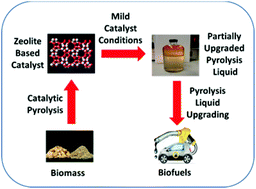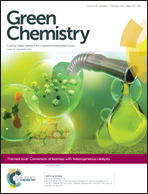Mild catalytic pyrolysis of biomass for production of transportation fuels: a techno-economic analysis†
Abstract
A techno-economic analysis of mild catalytic pyrolysis (CP) of woody biomass followed by upgrading of the partially deoxygenated pyrolysis liquid is performed to assess this pathway's economic feasibility for the production of hydrocarbon-based biofuels. The process achieves a fuel yield of 17.7 wt% and an energy conversion of 39%. Deoxygenation of the pyrolysis liquid requires 2.7 wt% hydrogen while saturation of aromatic rings in the pyrolysis liquid increases total hydrogen consumption to 6.4 wt%. Total project investment is $457 million with annual operating costs of $142 million for a 2000 metric ton per day facility. A minimum fuel selling price (MFSP) of $3.69 per gal is estimated assuming 10% internal rate of return. Twenty-nine percent of the capital outlay is the result of including a co-generation system to consume heat generated from burning part of the off-gases from pyrolysis and upgrading and all of the coke during regeneration of catalysts. Forty-five percent of the MFSP arises from the cost of biomass feedstock. Hydrogen required for the upgrading process is generated using the balance of the process off-gases. The analysis reveals that an optimum design would include a cogeneration unit; however using natural gas for hydrogen generation is more favorable than using process off-gases as the feed. An uncertainty analysis indicates a probable fuel price of $3.03 per gal, demonstrating the potential of the CP pathway as an alternative to petroleum-derived transportation fuels.

- This article is part of the themed collection: Conversion of biomass with heterogeneous catalysts

 Please wait while we load your content...
Please wait while we load your content...